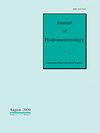植被表现影响科罗拉多河流域预估的流量变化
IF 2.9
3区 地球科学
Q2 METEOROLOGY & ATMOSPHERIC SCIENCES
引用次数: 0
摘要
利用中分辨率成像光谱辐射计(MODIS)的观测资料,对变入渗量(VIC)水文模型的植被参数进行了更新。先前的研究表明,与涡旋相关方差观测相比,这些基于modis的参数改善了VIC蒸散发模拟。由于科罗拉多河流域蒸散发的重要性,本研究利用更新的基于modis的植被参数,对VIC土壤参数进行了逐流域校准,以改进径流模拟。有趣的是,虽然这两种配置具有相似的历史流量表现,但在RCP8.5排放情景下,由29个缩小规模的全球气候模型驱动的世纪末水文预测在两种配置之间存在差异。校准后基于modis的配置具有总体平均值,与历史时期(1960-2005年)相比,模拟了Lees Ferry的世纪末年流量变化很小(+0.4%)。相比之下,以前用于科罗拉多河流域未来水资源决策的VIC配置预测年流量减少11.7%。两种VIC配置在历史时期模拟了相似的蒸散量。然而,基于modis的VIC配置并没有显示出到本世纪末蒸散量的增加,主要是在上游盆地的森林地区。蒸散发预估的差异是由于基于modis的植被参数与最近科罗拉多河流域水文预估中使用的以前的植被估计值相比,叶面积指数值更低,森林面积更少。这些结果强调了在水文模型中准确表征植被和更好地约束气候敏感性的必要性。本文章由计算机程序翻译,如有差异,请以英文原文为准。
Vegetation representation influences projected streamflow changes in the Colorado River Basin
Vegetation parameters for the Variable Infiltration Capacity (VIC) hydrologic model were recently updated using observations from the MODerate Resolution Imaging Spectroradiometer (MODIS). Previous work showed that these MODIS-based parameters improved VIC evapotranspiration simulations when compared to eddy covariance observations. Due to the importance of evapotranspiration within the Colorado River Basin, this study provided a basin-by-basin calibration of VIC soil parameters with updated MODIS-based vegetation parameters to improve streamflow simulations. Interestingly, while both configurations had similar historic streamflow performance, end-of-century hydrologic projections, driven by 29 downscaled global climate models under the RCP8.5 emissions scenario differed between the two configurations. The calibrated MODIS-based configuration had an ensemble mean that simulated little change in end-of-century annual streamflow volume (+0.4%) at Lees Ferry, AZ relative to the historical period (1960-2005). In contrast, the previous VIC configuration, which is used to inform decisions about future water resources in the Colorado River Basin projected an 11.7% decrease in annual streamflow. Both VIC configurations simulated similar amounts of evapotranspiration in the historical period. However, the MODIS-based VIC configuration did not show as much of an increase in evapotranspiration by the end of the century, primarily within the Upper Basin’s forested areas. Differences in evapotranspiration projections were the result of the MODIS-based vegetation parameters having lower leaf area index values and less forested area compared to previous vegetation estimates used in recent Colorado River Basin hydrologic projections. These results highlight the need to accurately characterize vegetation and better constrain climate sensitivities in hydrologic models.
求助全文
通过发布文献求助,成功后即可免费获取论文全文。
去求助
来源期刊

Journal of Hydrometeorology
地学-气象与大气科学
CiteScore
7.40
自引率
5.30%
发文量
116
审稿时长
4-8 weeks
期刊介绍:
The Journal of Hydrometeorology (JHM) (ISSN: 1525-755X; eISSN: 1525-7541) publishes research on modeling, observing, and forecasting processes related to fluxes and storage of water and energy, including interactions with the boundary layer and lower atmosphere, and processes related to precipitation, radiation, and other meteorological inputs.
 求助内容:
求助内容: 应助结果提醒方式:
应助结果提醒方式:


